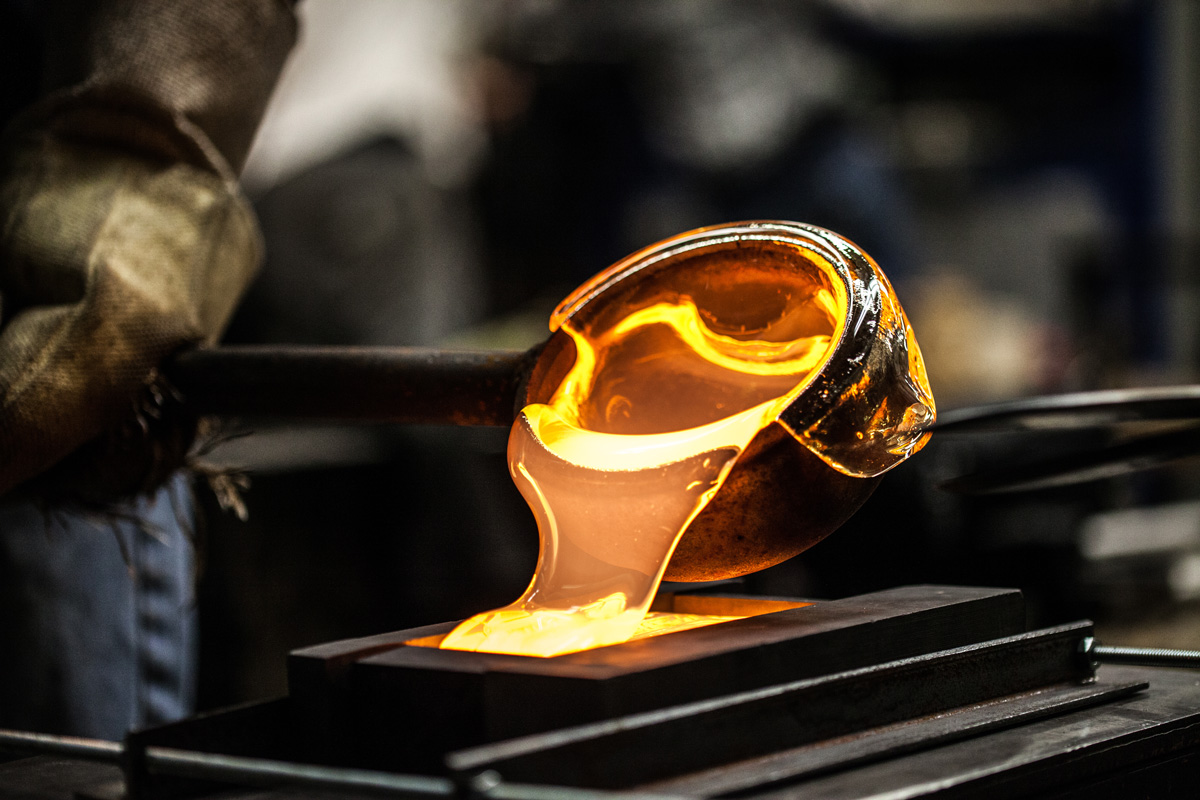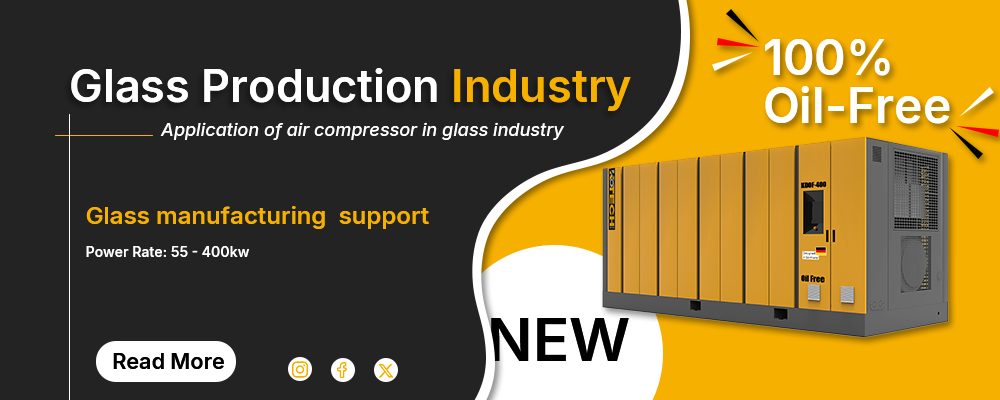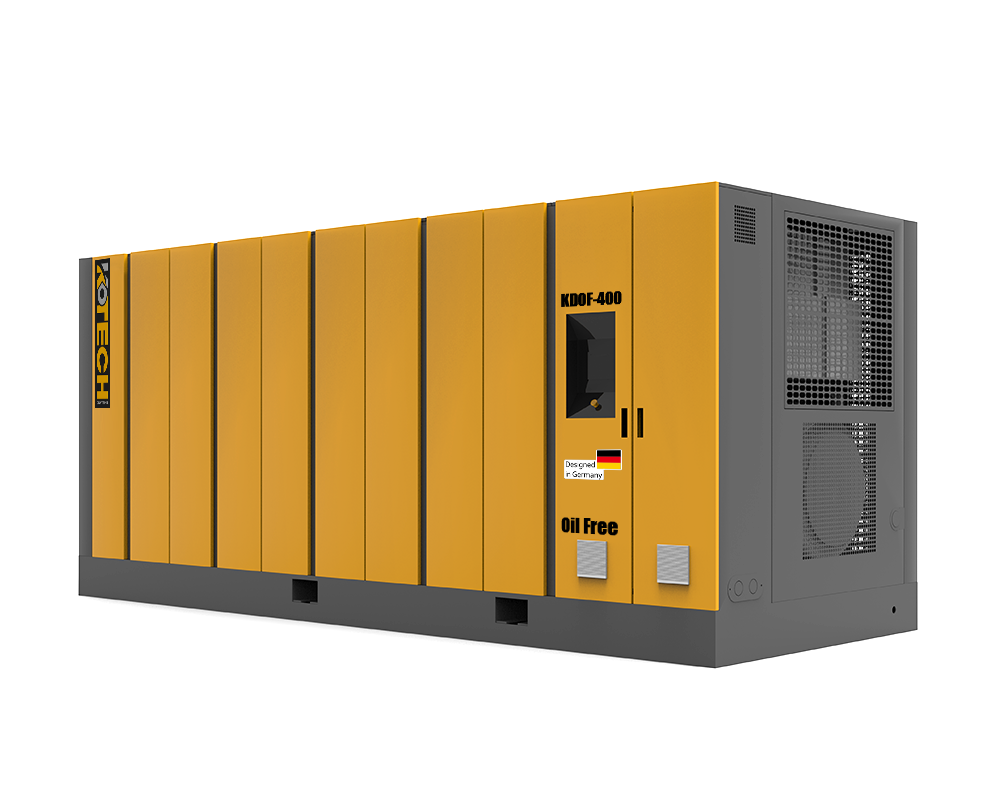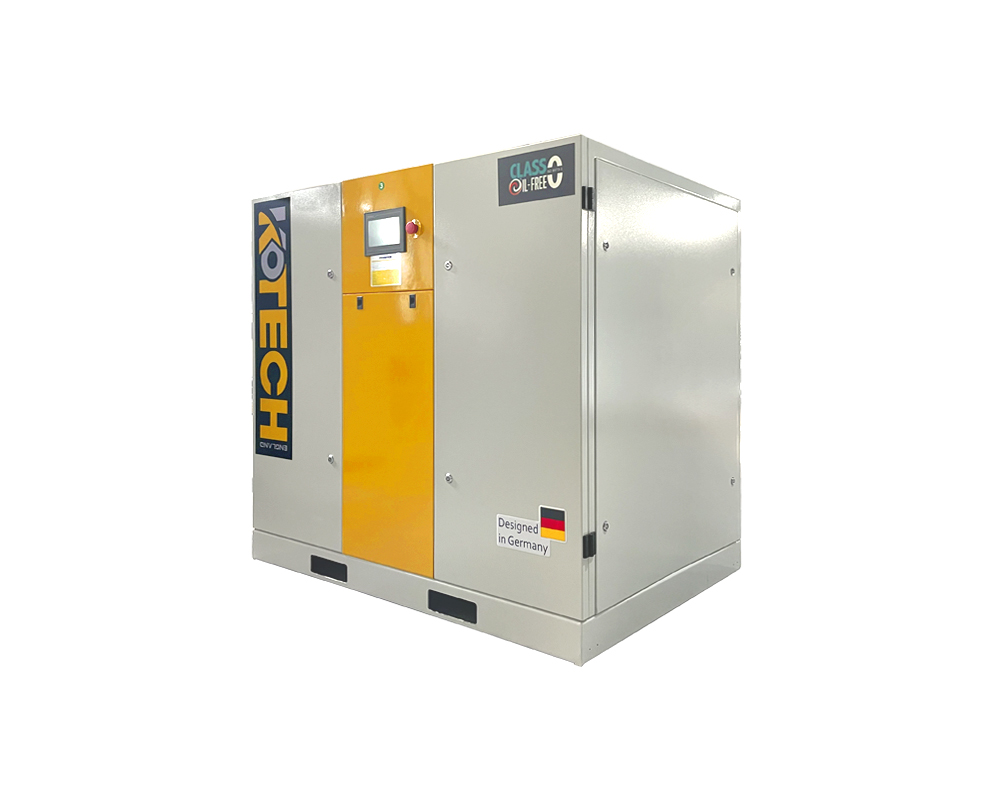Applications of Air Compressors in Glass Industry.
Glass Manufacturing Industry
Glass is one of the most widely used industrial products in the world. It is beautiful and strong. From small decorations, mobile phone cases, and packaging to large cars, skyscrapers, and aircraft, glass is indispensable. Glass is also one of the most environmentally friendly products of all mass-produced products because it is 100% recyclable. Glass is also one of the safest products for storing food because it does not contain hormone disruptors or carcinogens.
Compressed air plays a key role in the glass industry, so air compressors are also widely used in the glass manufacturing industry worldwide.
In the current manufacturing industry, the use of air compressors has been gradually iterated from oil to oil-free air compressors, to say that the use of oil-free air compressors more manufacturing industries, glass manufacturing absolutely ranked into the top three, then about the oil-free air compressors in the glass industry, what are the specific applications?
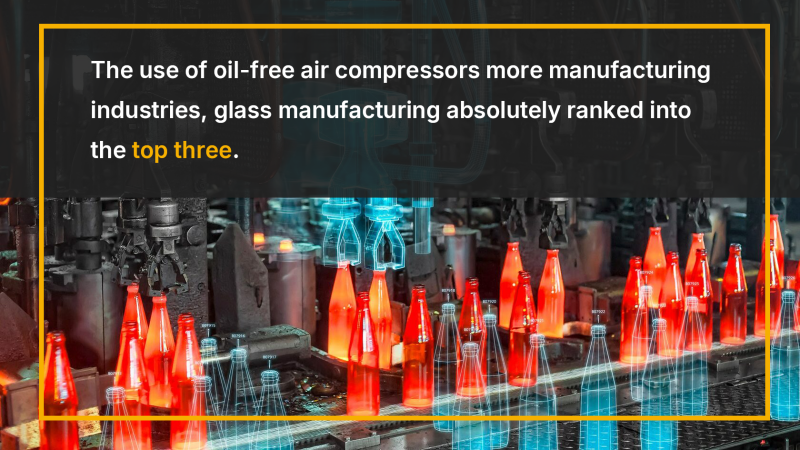
Water-lubricated oil-free air compressor as environmental protection and energy-saving equipment recognized by many glass manufacturing enterprises, especially some PET blowing enterprises, speaking of PET blowing, we can frequently come into contact with the life of the Coke bottle and many directly drinkable beverage bottled consumer products, such products for the bottle of environmental protection and edible has very high requirements.
How Glass Bottles Are Manufactured
Glass can be divided into flat glass, float glass, tempered glass, frosted glass, sandblasted glass, embossed glass, wired glass, hollow glass, etc. according to the glass manufacturing process. Take the common flat glass in our lives as an example, let’s take a look at the manufacturing process of flat glass.
Raw material mixing: In terms of raw material formula, manufacturers can make appropriate adjustments according to specific products. Ordinary flat glass is made of quartz sand, silica sand, potash fossil, soda ash, and Glauber’s salt. These raw materials are mixed in a certain proportion and stirred evenly.
Melting of raw materials: Mix the raw materials and add them into the furnace. The temperature in the furnace can be determined according to different products, generally around 1200 to 1600 degrees. Pour it out after sealing and heating it in the furnace for a certain period of time.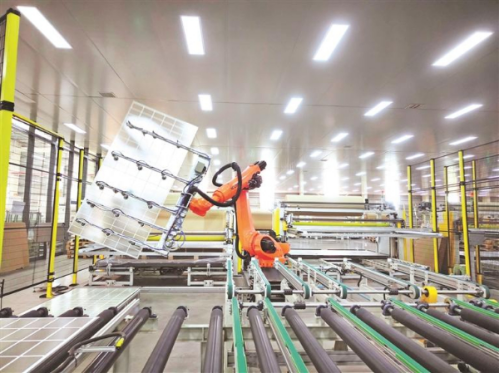
Glass forming: The heated glass melt flows into the tin tank and floats on the molten metal tin liquid. Glass forming generally includes blowing, pressing, centrifugal rotation, firing (auxiliary) and other methods. Flat glass is pressed out by vertical drawing method or flat pulling method and rolling method to form a glass ribbon with appropriate width and thickness, uniformity and flatness.
Cooling of glass: The temperature of the glass ribbon is about 600 degrees Celsius when it leaves the tin bath, and then it enters the annealing room or continuous slow cooling kiln to gradually reduce the temperature of the glass to 50 degrees Celsius. Glass produced by this cooling method is also called annealed glass.
Cutting of glass: The original glass itself is very large, generally about 3*2 meters in length and width. The glass factory will cut it into different sizes according to customer needs (cutting requires the edge grinding size)
Grinding of glass: The edge of the newly cut glass is very sharp. The glass factory can grind the fog edge or bright edge according to customer needs. Generally speaking, customers with higher requirements for glass brightness and aesthetics will grind the bright edge.
Inspection and packaging: After polishing, the glass undergoes several stages of quality inspection to achieve safety and meet standard quality, and then it is packaged for warehousing, storage or transportation.
Oil-Free Air Compressor for Glass Manufacturing
In the past PET bottle blowing manufacturing process, some micro-oil or oil screw compressor compressed gas, it is completely impossible to achieve 100% oil-free, a small amount of oil mist carried in the air will enter the bottle along the air outlet, causing some harm to the human body.
In order to avoid the occurrence of such problems, so there is a water lubrication talk oil-free air compressor was introduced. Oil-free air compressors have a variety of applications in the glass industry.
The following are some of the main application areas:
1. Glass cutting: In the glass cutting process, high pressure gas is needed to remove the dust and debris from the glass surface to ensure the cutting quality. The use of oil-free air compressor can provide clean, oil-free, odorless compressed air, avoiding the impact of oil pollution on the cutting quality.
2. Glass sandblasting: When sandblasting the glass surface, it is necessary to use compressed air to spray sand particles onto the glass surface. The use of oil-free air compressor can avoid the impact of oil pollution on the glass surface, and at the same time can provide stable air pressure and flow to ensure the sandblasting effect.
3. Glass drilling: In glass drilling, it is necessary to use high-speed rotating drills and coolant. The use of oil-free air compressor can provide stable air pressure and air flow for driving the drill, and can provide clean compressed air for cooling.
4. Glass Lamination: When applying film on the glass surface, compressed air is used to adsorb the film onto the glass surface and squeeze out the air. The use of oil-free air compressor can provide clean, oil-free, odorless compressed air, to avoid the impact of oil pollution on the film.
In conclusion, oil-free air compressors are widely used in the glass industry, which can provide clean, stable and reliable compressed air and ensure the quality and efficiency of glass processing.

Are you looking for a reliable and efficient power source for your glass industry? Kotech dealers are experienced in finding the perfect air compressor for your needs.
Contact your local Kotech dealer today and discover how an air compressor can increase your productivity and safety.
Significance of compressed air in glass manufacturing and risks of air outages
✎ Air outage in the combustion system
This will prevent the combustion medium of the production line from being fully atomized, affecting the temperature of the melting furnace, resulting in the inability of the raw materials to be fully burned. Some raw materials such as silica sand cannot be melted adequately and will be deposited at the bottom of the pool, which will prevent the float glass production line from producing qualified products for a long time;
✎ Transportation air outage
Although this link can be replaced by vehicle transportation, it will reduce the overall transportation speed and increase the transportation cost. More importantly, during the transportation and powder loading and unloading process, the impact of dust on the surrounding people and the environment cannot be avoided.
✎ back-blowing air outage
The filter element or bag inside the dust removal equipment will be blocked, causing the dust collector to fail to work, which will lead to positive pressure inside the powder bin, resulting in the positive pressure of the tank bursting or powder overflowing the tank, causing the powder (such as coal tar powder, lime powder) to escape, causing major environmental accidents;
✎ Air source of equipment and instrument outage
Float production line of glass manufacturing adopts automated production flow operation, and the internal equipment has a high degree of automation, such as DCS system automatic flue air gate switching, rotary gate control, fuel reversing system, tin tank edge drawing machine and other equipment.
When the operating compressed air source is stopped, there may be accidents such as failure to automatically change the fire, failure to control the opening of the flue air gate, and full tin tank glass. If the above accidents are not fully prevented, they may cause unnecessary production accidents.
Suspension of compressed air may cause the melting furnace to stop firing for a long time, resulting in the collapse of the entire production line. If it cannot be restored in a short time, it may cause the melting furnace to be drained and cooled in advance, which may be a fatal blow to glass manufacturers.
Why are more and more oil free air compressors used in glass manufacturing?
In the past glass bottle manufacturing process, the air compressed by the oil injected air compressor and the so-called “technically oil free” air compressor could not be truly 100% oil-free. A small amount of oil mist carried in the compressed air would enter the bottle along the air outlet, causing certain harm to the product and the human body. In order to avoid such problems, water lubricated oil free air compressors were introduced.
Oil free air compressors play many important roles in the glass industry. Here are several major application areas:
Glass cutting: During the glass cutting process, high-pressure air is needed to remove dust and debris from the glass surface to ensure cutting quality. The use of oil free air compressors can provide clean, oil free, and odorless compressed air, avoiding the impact of oil pollution on cutting quality.
Glass sandblasting: When sandblasting the glass surface, compressed air is needed to spray sand particles onto the glass surface. The use of oil free air compressors can avoid the impact of oil pollution on the glass surface, and at the same time provide stable air pressure and flow to ensure the sandblasting effect.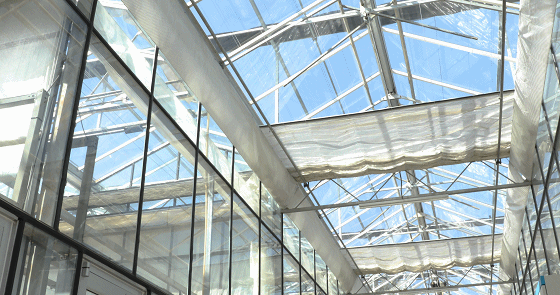
Glass drilling: When drilling holes in glass, high-speed rotating drill bits and coolants are required. The use of oil-free air compressors can provide stable air pressure and airflow for driving drill bits, and can provide clean compressed air for cooling.
Glass film: When applying film on the glass surface, compressed air is needed to adsorb the film to the glass surface and squeeze out the air. The use of oil-free air compressors can provide clean, oil-free, and odorless compressed air, avoiding the impact of oil pollution on the film.
In short, oil-free air compressors are widely used in the glass industry because it can provide clean, stable, and reliable compressed air, ensuring the quality and efficiency of glass manufacturing, which is now increasingly demanding.
Application of Air Compressor in Glass Manufacturing
As we mentioned before, air compressors are used by industrial glass manufacturers all over the world. Air compressors are essential for molding bottles, glassware, and blowing tubes for lighting and electronics, among other things. Typically, compressed air in glass manufacturing is used to power pneumatic tools, convey materials, and generate electricity.
More specifically, air compressors for the glass industry are used in the following applications:
1. Use pneumatic power to transport raw materials
Mainly used for pipeline transportation and blowing of coke powder, such as ultrafine powder in the grinding workshop is transported to each use workshop through compressed air through pipelines, achieving a more reliable transportation speed, reducing production and transportation costs, and avoiding the impact of ultrafine dust diffusion on the surrounding environment during transportation.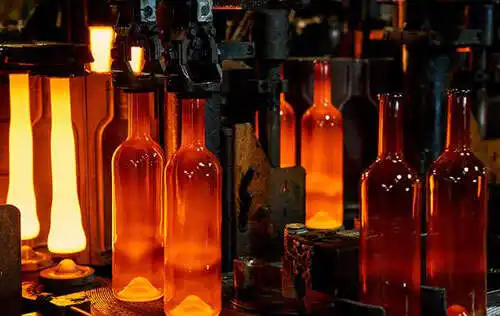
2. Help combustion in the furnace
It is used to assist the combustion of glass liquid in the production line melting furnace, so that the medium is atomized to achieve overall full combustion, and is used for purging the idle oil (powder, natural gas) cavity and cooling and cooling protection of the cavity during the fire change process.
3. Shaping liquid glass
Press, shape and maintain the temperature of the glass during the processing process. Its main function is to control the temperature and compression speed of the glass to ensure the stability and uniformity of the glass quality.
Bottle blowing technology: Use filtered and dried compressed air to make molten glass into narrow-necked bottles and cans through pressure blowing.
4. As a power source for various instruments and equipment
It is used as the operating air source for pneumatic equipment in various workshops, such as cylinders and pneumatic ball valves. In addition, the air compressor can also use compressed air to transport hot glass from one place to another through pipelines to achieve dust-free contact, automation and efficient operation in the production process.
5.Clean glass and workshops
It is used for bag or filter cartridge back-flushing of dust collecting equipment such as dust collectors and self-cleaning air filters, such as bag back-flushing on the top of the dust collection silo in the semi-dry desulfurization system and the ash collection system to fully filter particulate matter in the air; it is used for purging the catalyst module of the denitrification tower in the environmental protection denitrification system.
Compressed air purging can reduce the pressure difference between the inlet and outlet of the denitrification tower, so that the flue gas and the catalyst can be fully reacted, and the nitrogen oxide content in the flue gas can be reduced.
Choose the Right and Reliable Air Compressor Solution
For most glass manufacturing companies, the investment cost of a good glass production line is very high. Once it starts production, it should not be interrupted easily. It is impossible for glass manufacturers to control production and inventory by flexible stopping and starting air compressor production like the other industries.
Therefore, glass manufacturers have very high requirements for the stability of compressed air. What are the points worth noting? Here are some suggestions:
First of all, the selection of air compressors must be very reasonable considering the gas consumption of the company’s production. Secondly, the use pressure of the glass industry is a key indicator to determine the terminal intake pressure and the layout of the workshop pipeline.
In combination with these parameters, the basic parameters of the air compressor are considered, pressure, altitude of the use site, flow, single-stage or double-stage or centrifugal (as for whether single-stage or double-stage or centrifugal is better, considering their power and procurement cost is the key factor) according to the actual situation of the company.
Secondly, the brand of the air compressor. It is generally recommended to give priority to well-known brands with a good reputation, and consider medium and large-scale air compressor companies with their own production plants in combination with cost factors.
But whether it is a well-known brand or a small and medium-sized enterprise, you should pay special attention to their after-sales service in your local area and the industry usage survey. Good quality and stable use of the air compressor are the prerequisites, followed by the purchase cost and use cost.
Well-known brands generally recommend Atlas Copco, Ingersoll Rand, and Sullair. Users can also consider Kotech Group. (Oil-Free Product Details)
The quality of Kotech KWI series water-lubricated oil-free screw air compressors has reached the international leading level and has ISO Class 0, ASME, PUV and other international standard certifications.
With many years of sales experience in the glass industry, strong and professional salesmen and technicians can combine the actual production conditions of customers and adapt to local conditions to provide reliable low-pressure energy-saving solutions for the glass industry. While ensuring the excellent stability of industrial air compressors in manufacturing and production, it reduces costs and increases efficiency for customers.
100% Oil Free Water Lubricated Screw Air Compressor
- Variable Frequency Oil Free Water Lubricated Compressor: Air cooling 15kw to 500kw Water cooling 37kw to 500kw
- Best Efficiency of Inverter
- Completely free from the problem of oil
- Oil free type with maximum flow rate
- Lowest management & repair cost
- Highest efficiency and energy saving
- Sealing, lubrication, and chilling with pure water (completely oil free)
Oil Free Dry Screw Air Compressor:
- Advantages: Higher air output, lower maintenance than reciprocating compressors.
- Disadvantages: Initial cost.
- Reliability: Analyze preventive maintenance practices to enhance reliability and minimize downtime.
Oil Free Scroll Air Compressors:
- Advantages: Minimal vibration, quieter operation, suitable for clean room applications.
- Disadvantages: Limited air output for high-demand processes.
- Maintenance: Reliability is further enhanced through proactive maintenance practices, ensuring minimal downtime and optimal performance in medical settings.
In view of the characteristics of the glass industry, such as long machine operation time, no shutdown, large compressed air consumption, low air pressure, and harsh air environment, combined with the demand for stable air source, clean and oil-free, Kotech’s permanent magnet single-stage low-speed low-pressure series, permanent magnet two-stage low-pressure series, and intelligent permanent magnet variable frequency air compressor are all ideal choices.
In the after treatment equipment, precision filters and cold dryers are configured for purification. The dew point value of the treated compressed air can reach -70 degrees, the filtration accuracy is 0.01μm, and the impurity particles, oil-free, and water-free all meet international standards, meeting the continuous gas demand of the glass industry. Contact us now to learn more!


